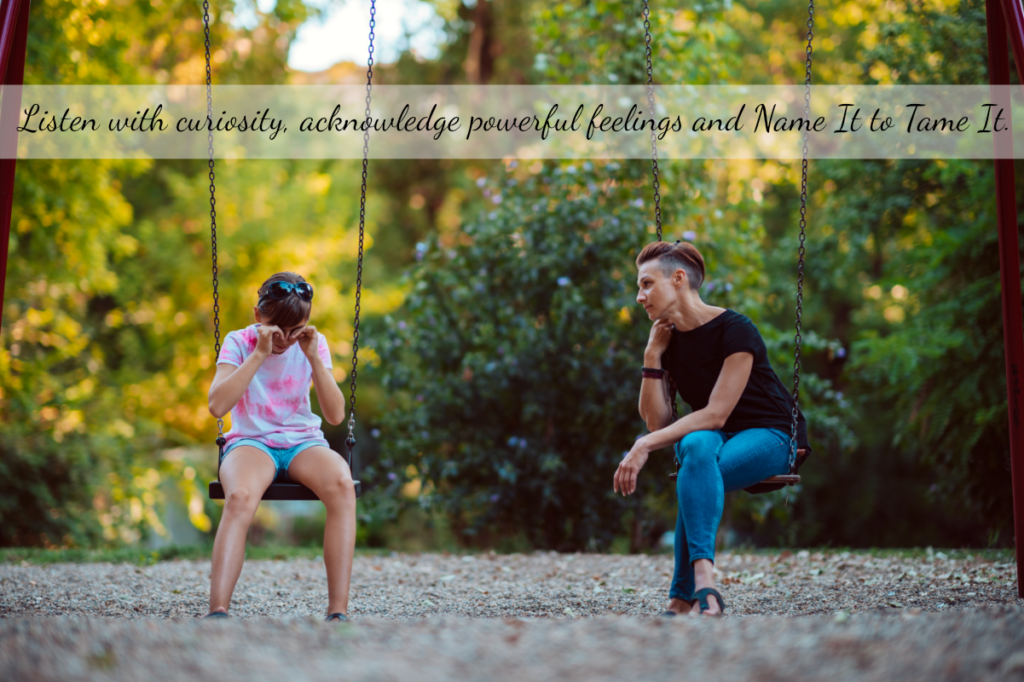We all want our children to thrive and flourish in an uncertain world. Now, more than ever, it is imperative the we model and teach children these life long skills to help them build resilience. Try out these five tips to help your child thrive!
1. Be honest without Over-Explaining
When children ask questions, provide answers in honest child-friendly chunks that they can understand. There’s no need to over-explain. According to Behavioral Pediatrician, Nerissa Bauer, when children have access to accurate information, it allays fears and worries. Children intuitively pick up on our own worries and uncertainty. We don’t always have the answers and it is important to be honest and to focus on what we know to be true. Clarify any misunderstandings or assumptions. Answer their questions with accurate and developmentally appropriate information to help develop their social and emotional competency.

2. Validate Feelings to Help Your Child Thrive
Everyone experiences a range of feelings and emotions. To fully thrive in an uncertain world, we must acknowledge and accept feelings as they arise. It is important to acknowledge your child’s feelings and empathize with their sadness or frustration. It can be helpful for children to name their feelings. As Dr. Dan Siegel writes in his book The Whole-Brain Child, we need to teach children to “Name It to Tame It” when it comes to powerful emotions.
It is well worth the spending time with your child to explore their emotional experience together. Missing out on summer camp, a birthday party, or prom may not seem like a big deal to us, but it could be crushing to an adolescent. It’s important to acknowledge their disappointment and to feel it with them in the same way that we like others to empathize with us. Try this activity from Greater Good in Action may help your children process their emotions. It is a simple activity that begins with curiosity.
3. Model Helpful Coping Strategies for your Child to Thrive
Children look to their caregivers for cues on safety. Research clearly indicates that the emotional well-being of young children is directly tied to the functioning of their caregivers and the families in which they live. If their primary caregiver is calm, a child feels reassured. If their primary adult caregiver is upset, the child feels unsafe, and their body and brain go into threat mode. We all get upset sometimes, but when the threat system is on too long without relief, physical and mental health problems can result. In essence, the parent’s own emotional state matters.
The presence of a calm adult can reduce the levels of cortisol, the stress hormone, in a child’s body. In fact, supported exposure to manageable stress is good for kids and builds resilience. Complete avoidance of stress undermines the development of resilience. Teaching your child how to deal with the ups and downs of life is one of the best lessons you can pass down to help your child thrive and flourish. Check out our Emotional Regulation Coping Tools to learn more!

4. Spend time in Nature
Nature is good for kids’ health and it improves their ability to learn. Children who spend more time in nature show more ability to concentrate, lower cortisol levels, stronger self-discipline, and are more physically fit. Full spectrum bright light exposure facilitates the production of serotonin, our antidepressant neurotransmitter. Bright daytime light paired with nightly exposure to darkness are key components to the circadian pathway.
5. Cultivate Healthy Habits
Sleep
According to Kristin Daley, a Behavioral Sleep Medicine Specialist, sleeping is critical to clean out the brain and consolidate information. Sleep is more important than ever during a pandemic because it strengthens our immune system. Most adolescents need 8.5 – 10 hours of sleep each night. According to SleepFoundation.org, begin sleep training about two weeks before school starts. To help your child, especially teenagers, move up their bed time, gradually move the wake-up time by one-two hours each day. For instance, if your daughter needs to get up at 6:00 a.m. for school, but she has been sleeping in until 11:00 a.m. all summer, begin waking her up at 9:00 a.m. As you wake them up earlier, eventually the need for sleep will catch up and their bodies will need to get to bed earlier.
Exercise
Exercise is truly essential for a healthy mind and body! It is essential for well-being by reducing stress, boosting our moods, and warding off infections.
Although these tips are simple, they are not easy to do. It takes consistency and practice for these simple tips to help your child thrive to become habits. Check out our other products promoting Courage, Confidence and Connection at https://www.teacherspayteachers.com/Store/Positively-Moxie.

